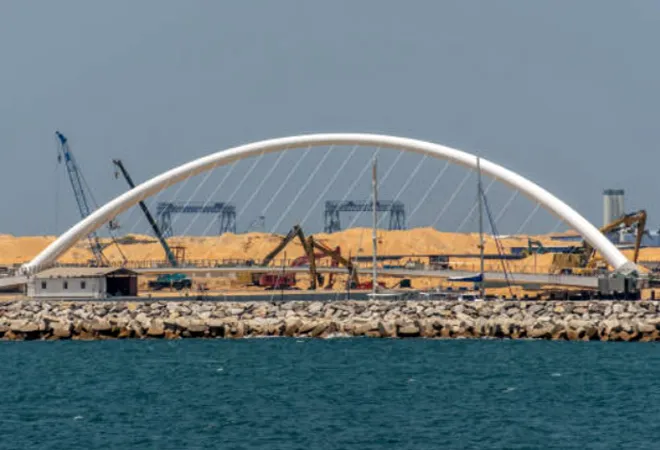
At first envisioned during Mahinda Rajapaksa’s presidency (2005-15), the Colombo Port City (CPC) project was announced on Xi Jinping’s visit to Sri Lanka in 2014. The CPC is one of China’s flagship projects and a major component of Xi’s Belt and Road Initiative (BRI). Spanning 269 hectares of reclaimed land from the sea, the project is worth US $1.4 billion and is the single largest investment in Sri Lanka. Colombo being amongst the top 25 busiest ports in the world, the proposed project is being marketed as a ‘world class city’ not just for Sri Lanka, but for South Asia.
The Rajapaksa administration under President Gotabaya, is firmly behind this project, promoting both its purported potential to attract foreign direct investment and prospects for job creation for locals.
While the previous administration of President Maithripala Sirisena and Prime Minister Ranil Wickresinghe briefly halted the project during 2015-2016 citing environmental concerns over dredging, under pressure following a high-level diplomatic visit (by the then Chinese Vice-Minister of Foreign Affairs, Liu Zhemin), they soon revived it. Since returning to power, the Rajapaksa administration under President Gotabaya, is firmly behind this project, promoting both its purported potential to attract foreign direct investment and prospects for job creation for locals. If it happens as promised, this will be the first Chinese-funded project to create thousands of jobs and generate family incomes for Sri Lankans.
Environmental concerns
The CPC has been raising concerns from the very beginning. Pejoratively referred to as “another Chinese enclave”, criticism against it has come from all quarters, both at the international and domestic levels. Since its inception, there has been consistent opposition from environmentalists about the detrimental impact of rock extraction on bio-diversity and marine life. In addition, there has been opposition from fisher folk regarding its impact on their livelihood. Fishermen living along the coastal area of Kammalthota have lamented that their incomes have already declined due to the depletion of fish resources as a result of sand mining. It has been feared that the extraction of sand by mining sea bottom from Hendala to Basiyawatta of Thalahena will adversely affect the livelihoods of the locals who live by fishing in and around this area.
There are numerous related issues that could arise as the project progresses, such as water pollution, waste-dumping, port- dredging, discharge of ballast water from cargos, soil pollution, acidification, and acid rains.
Sand mining is also expected to affect lagoons, particularly the famous Negombo lagoon. Though the CPC project has completed three Enviornmental Impact Assessments (EIA), the criticism has been that these assessment reports have not addressed several related issues adequately enough. There are numerous related issues that could arise as the project progresses, such as water pollution, waste-dumping, port- dredging, discharge of ballast water from cargos, soil pollution, acidification, and acid rains.
CPC Economic Commission Act
The political Opposition, NGOs, and civil societies opposed the government move, in April 2021, when it presented the CPC Economic Commission Bill to the Parliament. The bill provided for the setting of a commission with decision-making powers on issues as varied as providing tax breaks and other concessions, clearing business applications, and making exceptions. According to the draft bill, the members of the commission are not responsible to the Parliament or parliamentary committees, or the nation’s Auditor-General, a constitutional authority.
The Opposition parties while welcoming the potential for growth, development and job creation, were critical of the commission pointing out that it was “an all-powerful commission answerable to no one”. The bill, they argued, surpassed Sri Lanka’s sovereignty, because it gave the CPC Commission immunity from Sri Lankan law. Some Buddhist monks too opposed the bill on similar grounds. Leader of the Opposition, Sajith Premadasa criticised the bill, on the grounds that it violated the concept of ‘one-country-one-law’, which the Rajapaksa administration was promoting otherwise. He said, “If this bill is passed, we will get one law in the country and another in Port City.” MP for Kandy District, Lakshman Kiriella, who is also the Opposition chief whip, said that CPC would resemble a separate state outside parliamentary supervision as 25 Acts passed by the Parliament would not apply to it. JVP leader Anura Kumara Dissanayake said that the proposed law would help turn the Port City into a province of China.
After several petitions were filed by both opposition parties and NGO groups, the Supreme Court recommended certain amendments. The government accepted these changes obviating the need for a two-thirds majority under Sri Lankan law, which would have been the case had it sought passage for the draft bill. In May 2021, the Parliament passed the Bill with a majority of 149 legislators (out of 225) voting in its favour (58 against), officially declaring the creation of Sri Lanka’s first Special Economic Zone (SEZ).
US reaction
During an interview in August 2021, the then US Ambassador, Alaina B. Teplitz, “expressed concern that the government should create the best possible business environment to attract investment to Port City” and warned against poor practices or even illicit finance like money laundering and corruption. Similar concerns were raised by other observers, such as Transparency International Sri Lanka (TISL) which felt that inadequate oversight could lead to money laundering.
JVP leader Anura Kumara Dissanayake said that the proposed law would help turn the Port City into a province of China.
Answering a related question about the QUAD and the Indo-Pacific, Amb Teplitz said, “We want to make sure that this vast region of the world is accessible, it’s dynamic, governed by international law, and that key principles such as freedom of navigation and peaceful resolution of disputes are the rules that govern this space…as democracies the United States and Sri Lanka really should be sharing common goals.”
India’s concerns
India’s concerns though not officially articulated are manifold. First, the CPC is located a mere 290 kilometres from Kanyakumari at the land’s end. The presence of China in Hambantota with its potential for intelligence gathering, surveillance, and possible berthing rights to Chinese submarines has already raised alarms for India. Both Colombo and Hambantota (though denied by Colombo) provide strategic positions in the Indian Ocean Region (IOR). Chinese Ambassador to Sri Lanka Qi Zhenhong has emphasised Beijing’s absolute focus, on these two projects, describing them “as dual engines of growth”.
Second, Sri Lanka cancelled the East Container Terminal (ECT) agreement, on the basis of domestic opposition and sovereignty concerns but decidedly pushed through the Economic Commission bill despite similar concerns being raised. This has not gone unnoticed in India. Though serious concerns linger about the hasty process through which the bill was passed, particularly the inadequate time given to parliamentarians to review the revised version of the bill and the fears around illicit financial flows, this has made little difference to the progress of the project.
Sri Lanka cancelled the East Container Terminal (ECT) agreement, on the basis of domestic opposition and sovereignty concerns but decidedly pushed through the Economic Commission bill despite similar concerns being raised.
Third, though India-Sri Lanka relations have been multi-faceted and unique, China’s economic engagement with Sri Lanka has grown deeper and undeniably stronger in a relatively short of time. It is clear that China will take further advantage of Sri Lanka’s current economic situation, particularly centred on forex reserves. Foreign Direct Investment (FDI) plays a crucial role in the economic development of island-nations and in this regard the CPC is set to attract huge amounts of FDI into Sri Lanka. The CPC ultimately highlights two things; one, for smaller island nations looking to turbocharge their economies saying no to Chinese money, despite visible and real concerns, will be a challenge; two, as great power contestation grows in the Indo-Pacific, island nations and competing for influence over them will become all important for both China and India.
The views expressed above belong to the author(s). ORF research and analyses now available on Telegram! Click here to access our curated content — blogs, longforms and interviews.




 PREV
PREV


